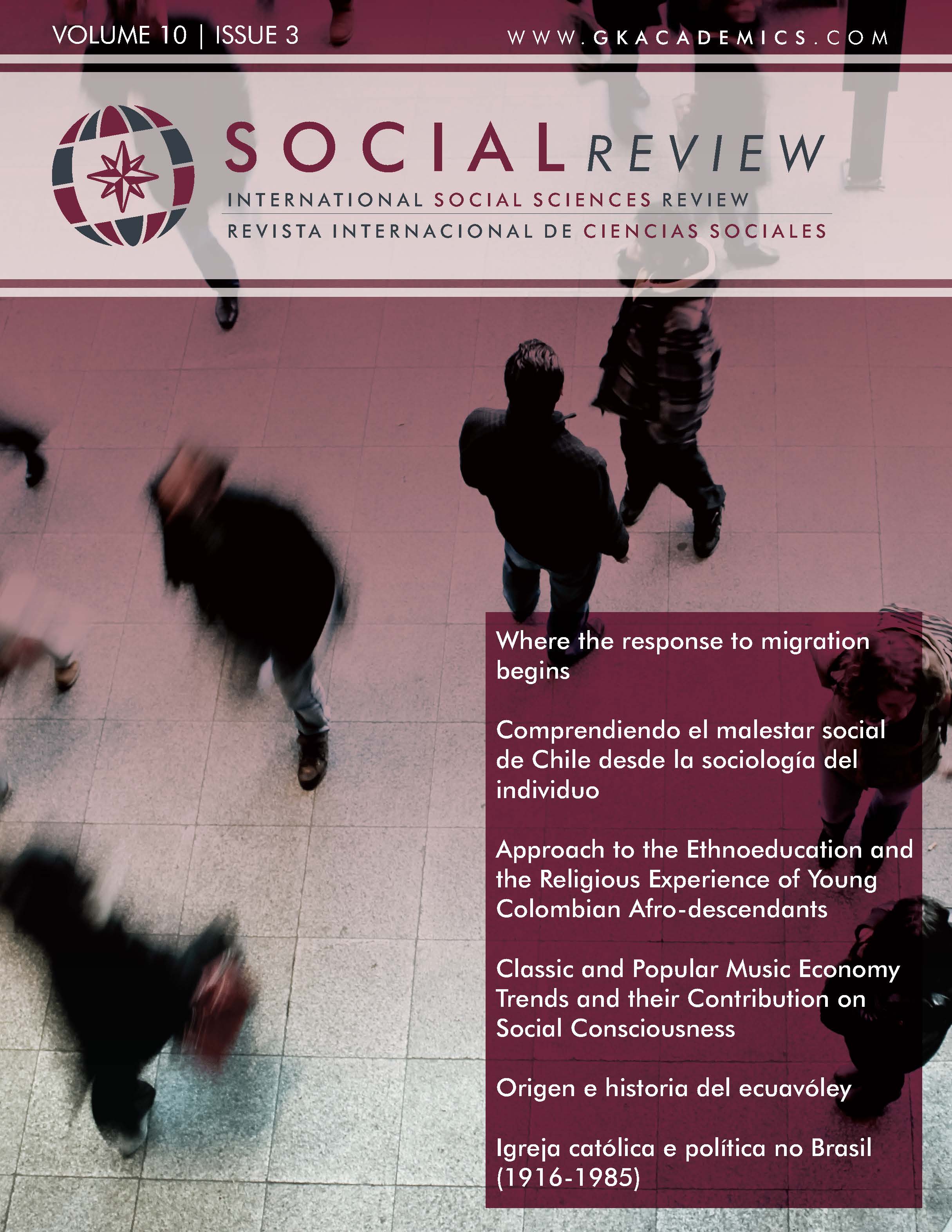Approach to the Ethnoeducation and the Religious Experience of Young Colombian Afro-descendants
Tracking of sociodemographic variables and analysis of religious and educational categories.
DOI:
https://doi.org/10.37467/gka-revsocial.v10.2821Keywords:
ethno-education, religious experience, education, Afro-descendant, cultureAbstract
Religion is a complex human phenomenon that can be analyzed from different epistemological and anthropological perspectives, from which religious experiences are reconstructed as part of the active relationship between personal consciousness and the disruptive presence of a transcendent "other". In Colombia, there is a significant population of young Afro-descendants who have a series of religious and cultural beliefs rooted in their origins and traditions. Under this consideration, in this research, case of study, it is analyzed how ethno-education, as a public policy in Colombia, allows the development of the religious experience of young Afro-descendants.
Downloads
Global Statistics ℹ️
|
465
Views
|
151
Downloads
|
|
616
Total
|
|
References
Alcaldía Mayor de Bogotá. (2011). Población afrocolombiana en el Distrito Capital. Bogotá.
Arbeláez, J., & Vélez, P. (2008). La etnoeducación en Colombia: una mirada indígena. Medellín: Universidad EAFIT.
Artunduaga, L. (2008). La Etnoeducación: una dimensión de trabajo para la educación en comunidades indígenas de Colombia. Revista Iberoamericana de Educación.
Batalla, G. (1981). La categoría de indio, una categoría de la situación colonial. México: UNAM.
Camelo, A., Posada, M., & Arrieta, A. (2019). Identidad y construcción de comunidad en la población afrocolombiana de la localidad de Suba, Bogotá. Tabula Rasa, 32, 271-288. DOI: https://doi.org/10.25058/20112742.n32.12
Congreso de Colombia. (1994). Ley 115 de 1994: Por la cual se expide la ley general de educación. Bogotá: Diario Oficial No. 41.214.
Corpas, I. (2010). Experiencia religiosa y lenguaje religioso: aproximación teológica. Universidad de San Buenaventura, 57-95.
Duch, L. (1979). La educación y la crisis de la modernidad. Barcelona: Paidos.
García, J. (2009). Sobre la experiencia religiosa: Aproximación fenomenológica. Folios.
Hernández Sampieri, R., et al. (2018). Metodología de la Investigación: las rutas cualitativa, cuantitativa y mixta. McGrawHill. México.
Martelo, L. (2015). Una aproximación a la categoría comunidad y su relación con los procesos de resistencia y emancipación. Bogotá: Universidad Javeriana.
Meza, J. (2009). Educación religiosa escolar: Naturaleza, fundamentos y perspectivas. Bogotá: San Pablo-Editorial Javeriana.
Mendieta, E. (2002). Sociología y religión. En F. Díez de Velasco y F. García Bazán (ed.), El estudio de la religión (pp. 103-120). Madrid: Trotta.
Ministerio de Cultura. (2010). Afrocolombianos, población con huellas de africanía. Bogotá.
Ministerio de Educación. (2007). Normatividad Básica para Etnoeducación.
Nicuesa, M. (06 de 2015). Definición de Experiencia Religiosa. Obtenido de https://www.definicionabc.com/religion/experiencia-religiosa.php
Patiño, P. E. (2004). Estado del arte de la etnoeducación en Colombia con énfasis en política pública. Colombia. Ministerio de Educación Nacional.
Quintar, E., & Quiñones, A. (2016). Memoria histórica, cosmovisión, cosmo-vivencia en el mundo afrocolombiano: problemática social derecho social y humano en niños, niñas y adolescentes afrodescendientes desplazados víctimas o afectados por violencia de Estado y el conflicto armado. Clacso.
Romero, F. (2008). La Educación Indígena en Colombia: Referentes conceptuales y sociohistóricos.
Rodríguez Garavito, C.; Alfonso Sierra, T. y Cavelier, A. (2008). El derecho a no ser discriminado. Primer informe sobre discriminación racial y derechos de la población afrocolombiana. Bogotá: Observatorio de Discriminación Racial, Ediciones Uniandes.
Secretaría Distrital de Planeación. (2014). Afrodescendientes e indígenas en Bogotá. Bogotá.
Downloads
Published
How to Cite
Issue
Section
License
Those authors who publish in this journal accept the following terms:
-
Authors retain copyright.
-
Authors transfer to the journal the right of first publication. The journal also owns the publishing rights.
-
All published contents are governed by an Attribution-NoDerivatives 4.0 International License.
Access the informative version and legal text of the license. By virtue of this, third parties are allowed to use what is published as long as they mention the authorship of the work and the first publication in this journal. If you transform the material, you may not distribute the modified work. -
Authors may make other independent and additional contractual arrangements for non-exclusive distribution of the version of the article published in this journal (e.g., inclusion in an institutional repository or publication in a book) as long as they clearly indicate that the work was first published in this journal.
- Authors are allowed and recommended to publish their work on the Internet (for example on institutional and personal websites), following the publication of, and referencing the journal, as this could lead to constructive exchanges and a more extensive and quick circulation of published works (see The Effect of Open Access).













